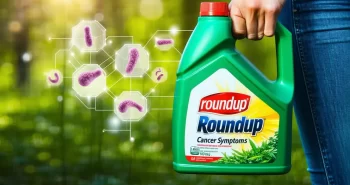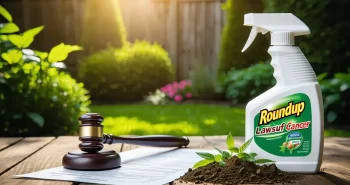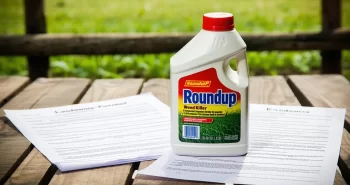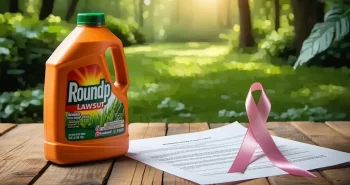Roundup vs Spectracide: Legal Risks and Lawsuits

Roundup vs Spectracide: if you’ve used these products and suffered health problems, you may be eligible for a lawsuit. This guide explains how to document exposure, understand legal eligibility, and file a claim for compensation. Learn what evidence you need and how to contact a lawyer to protect your rights.
Table of Contents:
Documenting Product Use for Claims
Let’s dig into the nitty-gritty of what makes Roundup and Spectracide tick. The safety of these weed whackers largely hinges on the stuff they’re made of, so let’s eyeball their ingredient lists and see what shakes out. Here’s a head-to-head look at what’s packed inside Roundup and Spectracide:
| Ingredient | Roundup | Spectracide |
|---|---|---|
| Glyphosate | Yes | No |
| Aminomethylphosphonic acid (AMPA) | Yes | No |
| Polyethoxylated tallow amine (POEA) | Yes | No |
| 2,4-D | No | Yes |
| Dicamba | No | Yes |
Glyphosate
Glyphosate’s the big cheese in Roundup. It’s stellar at nuking pesky weeds, but not without some controversy. There’s been chatter about its side gig as a health risk, with studies hinting at connections to things like cancer. For the full scoop, check out our deep dive on does roundup cause cancer.
Aminomethylphosphonic Acid (AMPA)
This tongue-twister is what’s left when glyphosate breaks down. While it’s not as famous (or infamous) as its parent, there’s a bit of buzz about its possible health hiccups. Think of it as the sidekick that might have its own surprises.
Polyethoxylated Tallow Amine (POEA)
POEA is like the secret sauce in herbicides, helping the main act do its thing. But don’t let its supporting role fool you—it might not play nice with aquatic life and could have a few health tricks up its sleeve for humans, too.
2,4-D and Dicamba
Switching channels to Spectracide, you’ll find 2,4-D and dicamba. These guys are the muscle for knocking out broadleaf weeds and more. But just like with glyphosate, there’s chatter about their potential to stir up some health mischief, too.
Decoding the lineup of ingredients in Roundup and Spectracide is like choosing your fighter in a video game—you want to know the strengths and weaknesses before you dive in. Understanding the potential health impacts is key for keeping both you and the planet happy. If Roundup has ruffled your health feathers, you might have a case for some legal TLC. Visit our guide on what proof do you need for Roundup lawsuit to see if you should pick up the phone and call a lawyer.
Exposure Evidence Needed for Legal Claim
Think about what happens to you if you’ve been hanging around weed killers like Roundup and Spectracide for too long. We’re talking real health concerns here, from annoyances like skin itchies to way more serious problems.
Putting Health Risks Side by Side
Here’s a street-level comparison between Roundup and Spectracide, focusing on how these weed busters play out on your health:
| Health Risk Aspect | Roundup | Spectracide |
|---|---|---|
| Skin Irritation | So-so chance of a rash | More itch factor |
| Breathing Problems | Not much lung hassle | More sniffs and coughs |
| Eye Trouble | A low blink risk | More of a teary scene |
| Allergies | Rare sneeze-a-thon | More likely to cause sneezes |
| Cancer Concerns | Cancer possibility scopes | Little info out there |
Eligibility for Roundup Lawsuit
Folks get worried about the cancer chatter linked with weed killers, especially Roundup. Lots of chatter says glyphosate, that’s the active stuff in Roundup, could hike up risks for certain cancers, like non-Hodgkin’s lymphoma.
Spectracide, it’s in a bit of a hazy zone when it comes to cancer risks. Not a ton of studies have been put under the spotlight for Spectracide’s ingredients, leaving us guessing a bit on its long-haul effects.
If you’re keen to deep-dive into what types of cancer are talked about in the Roundup legal buzz, check out our dedicated page on Roundup lawsuit cancers and what’s needed to put in a lawsuit claim Roundup lawsuit proof.
Keeping Safe and Knowing Your Legal Ground
If these weed killers are showing some fangs health-wise, you must know what you’re up against and keep yourself shielded. If you suspect a weed killer has turned into your health’s public enemy number one, you might be in line to make a legal move for compensation. For all things legal in this realm, make sure to swing by our guides on claiming in the Roundup lawsuit. The first knot in the safety thread is getting wise to the health risks tied to these herbicides and knowing your way through the legal maze.
Recording Exposure Incidents
Think about the little bundles of curiosity in our lives—our pets and kids. They have a knack for exploring everything, which is why safety is top priority when using weed killers like Roundup. These products can pose health risks, and it’s up to us to keep our loved ones out of harm’s way.
| Safety Factor | Roundup | Spectracide |
|---|---|---|
| Toxicity | Has glyphosate, risky if swallowed | Contains chemicals, could be dangerous if eaten |
| How to Use | Liquid, easy to spray | Comes in liquids and granules, use carefully |
| Lingering Effects | Stays in the soil for a while | Varies, so monitor closely |
Before you start spraying around areas where your kids or pets like to play, there are some safety rules to stick to. Keep these products locked up tight and make sure the rooms are well-ventilated when you’re using them. Wanna know more about using things like Roundup safely? Check out our article on how long after spraying Roundup is it safe for pets.
Make sure to watch your four-legged pals and tiny humans after spraying to stop them from wandering into treated spots. If you think they’ve had contact with it, don’t mess around—get medical help right away. For heads-up on spotting Roundup issues, peek at our piece on Roundup on skin.
Getting the low-down on what each kind of weed killer can do and playing it safe keeps both pets and kids healthy in spaces where these chemicals are used. Staying sharp and informed makes the home happy and secure for everyone.
Tracking Exposure Timeline for Legal Action
When we chat about using weed killers like Roundup for ages, it’s vital to think about if they could be tied to cancer. Scientists have dug into the effects of using glyphosate-heavy weed killers like Roundup and what it means for our health, especially when it comes to cancer.
Studies and Findings Uncovered
Loads of studies and reports put Roundup under the microscope for its cancer links. Some research says that folks heavily exposed to stuff like glyphosate may be at higher risk for nasties like non-Hodgkin lymphoma. These insights make us wonder about the risks of using Roundup on the regular.
How Cancer Risks Stack Up
Figuring out if you could get cancer from using Roundup a lot isn’t straightforward. You’ve got to think about how long and often you’re exposed, how much glyphosate is in the mix, and if you’re a bit more prone to getting sick. Getting glyphosate on your skin or breathing it in a lot could increase your chances of cancer over the years.
Legal Battles and Claims
The cancer worries around Roundup have sparked lawsuits by folks who blame it for their health troubles. When they go to court, they have to show how being around Roundup for too long might have led to something as serious as cancer. It’s a good idea to talk with a lawyer if you’re thinking about taking legal action, especially one who knows about product liability and personal injury inside out.
Getting Compensated
People who’ve ended up with cancer or other health issues after using Roundup forever might snag some compensation through court cases or settlements. By suing, those hit hard by herbicide exposure can ask for pay to cover medical bills, money lost from not working, pain, suffering, and other hardships. To dig deeper into how to file a claim and what might happen, check our piece on what cancers are included in the Roundup lawsuit.
Wrap-Up
While the chatter around herbicides like Roundup and long-term health risks goes on, staying clued in if you’ve been a frequent user is smart. Knowing about the cancer concerns linked to Roundup and checking out your legal routes for compensation can help you look after your health and stand up for your rights when faced with health issues tied to herbicides.
File a Claim With the Roundup Lawsuit
If Roundup has left you unwell, you might be in line for some financial justice. Filing a claim isn’t just about paperwork—it’s about getting what you’re rightfully owed after suffering due to this product.
Roundup Lawsuit Eligibility
Before calling a lawyer, you gotta know if you fit the bill. Folks who heard the big C-word—like non-Hodgkin lymphoma—after using Roundup might just have a case. There’s more on this in our piece about what cancers are included in the Roundup lawsuit. Give it a look.
Gathering Evidence
Building a case is like making a good soup—you need decent ingredients. Here, that means doctors’ notes, diagnosis papers, and proof you used Roundup. Forget your kitchen drawer of old receipts, check our advice on what proof do you need for roundup lawsuit and get prepped.
Finding Legal Representation
Dealing with big shots isn’t a walk in the park. You’re gonna want a lawyer who’s played this game before. They’ll fight your corner and help reel in a settlement. Don’t go it alone, read up on our guide about best lawyer for roundup lawsuit so you know who to call.
Understanding Settlements
Roundup case settlements get worked out between the parties involved; how much you’ll pocket depends on your health troubles and exposure level. Curious about payout times? Our article on when will roundup settlements be paid has all the answers you need.
Seeking Compensation
Filing your claim opens doors to covering bills, making up for lost paychecks, and dealing with the pain you’ve had. It’s about making those who’ve hurt you stay accountable. Not sure if you’re up for this? Look at our resources on who qualifies for roundup lawsuit for more intel.
If you’ve been hit hard by Roundup and are thinking about lawyering up, it’s time to take action to defend your rights and snag the compensation you deserve. Learn the ropes, gather up your proof, and partner with a savvy lawyer. Then, you can stride into the courtroom with your head held high, ready to claim the justice you’ve been waiting for.










